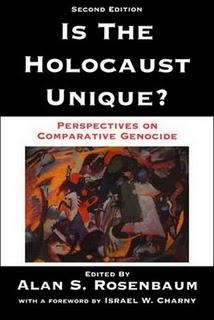Is the Holocaust Unique?: Perspectives on Comparative Genocide

In the third edition of this book, Alan Rosenbaum has collected a selection of brilliant, incendiary, and questionable essays addressing a sensitive yet much argued question. To quote Israel W. Charny in the foreword, “This book is outstanding because it brings together in one volume the contentious and often unsavory Tower of Babel of scholars’ voices in the field of Holocaust and genocide studies.” Rosenbaum tries to include a range of voices to create a comprehensive approach.
Rosenbaum says that his goal is to “underscore, in one way or another, the centrality of the Holocaust in any broad-based, contemporary inquiry made within the emerging area of comparative genocide studies.” Meaning, should the Holocaust remain the benchmark for modern genocides? Further, can we study the Holocaust alongside the twentieth century atrocities in Rwanda, Cambodia, and Sudan? Or is the Holocaust a particularly unique case of genocide, and should it be studied only within the context of Holocaust scholarship? Whichever side you support, you would be surprised to find that there are many people who vehemently believe the opposite. When we speak of genocides, especially in the twentieth century, the discussion often becomes personal and fraught with emotion.
For me, the chapters hardest to swallow are those too essentialist and definitive. They try to define exactly what a genocide is and therefore exclude certain atrocities from the category of genocide. This is the case in Barbara B. Green’s "Stalinist Terror and the Question of Genocide," where she determines that the Great Famine was not genocide because extermination was not the intent. Comparatively, there are essays that illuminate how learning about the Holocaust can shed light on other atrocities and the danger of future genocides, such as in Kinue Tokudome’s "The Holocaust and Japanese Atrocities" and Ben Kiernan’s "Hitler, Pol Pot, and Hutu Power: Common Themes."
The danger of this book is that it assumes a high level of critical thinking on the part of the reader. Due to the fact that questionable claims are made, one must be discerning and comprehensive in her reading of the essays. Do not assume that you can randomly choose one essay to answer the question “is the Holocaust unique?” I would not choose to teach this book, unless we had the time to read and discuss every essay. I would also only read this with a book group that is ready, critical, and understanding enough to discuss the destruction of human life.
Approaching human rights from an academic and intellectual standpoint can alienate and frustrate many people. To aid with a cohesive reading, Charny has included a very helpful list of questions in the foreword to help guide a reading of each chapter. Is the Holocaust Unique? is a challenging and valuable book for many readers. Even if you have your mind made up regarding your answer to this question you not only will find support for your opinions, but also will learn about other atrocities throughout the world. The mass destruction of human life is always wrong, no matter the ideology framing it, and Rosenbaum’s collection of essays helps to build awareness and knowledge about the roots of genocidal violence.